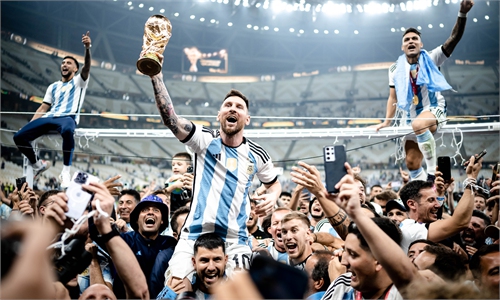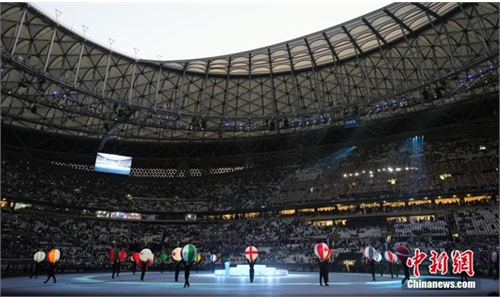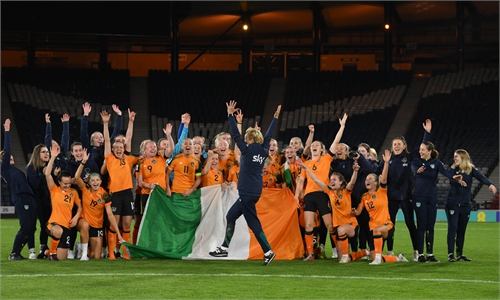Chinese companies become World Cup largest sponsors with $1.4 billion; brands promoted to larger market
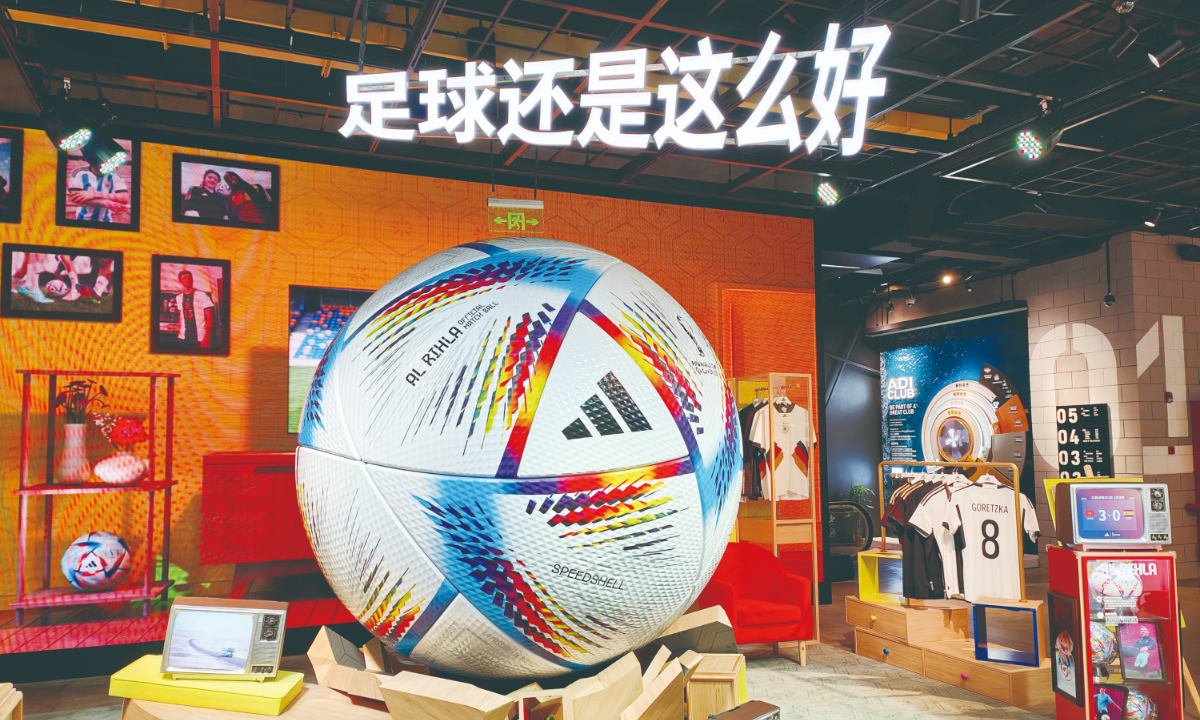
Al Rihla, official match ball of FIFA World Cup Qatar 2022 Photo: VCG
Argentina won their third World Cup after beating defending champion France Monday Beijing time. At the final whistle, as excited as the Argentine fans were, many Chinese sponsors, who bet on the correct winner as well as cross-border e-commerce manufacturers in Yiwu, China's small commodities hub, saw an immediate spike in orders and sales volume.As the quadrennial World Cup draws to a close, China's presence is everywhere in Qatar. Statistics show that during the FIFA World Cup Qatar 2022, the total amount of Chinese sponsorship reached $1.4 billion, making it the top sponsor among all nations around the world.
Popularity of Chinese elements
One of official sponsors of team Argentina, Chinese coffee chains Cotti Coffee pinned the news of Argentina winning the World Cup champion on its official Twitter-like Sina Weibo social media account.
The official website of Cotti Coffee also showed the company has released series of drinks using the theme colors of team Argentina jersey's blue and white.
Panpan Foods, which signed a cooperation agreement with team Argentina, also celebrated the World Cup victory on Sina Weibo on Monday with five consecutive posts promoting its energy drinks using Argentine themed patterns.
Chinese corporate sponsorship had accounted for around 10 to 15 percent of team Argentina's global sponsors as of November, according to Leandro Petersen, marketing manager from the Argentine Football Association.
The Argentina national football team has made sponsorship agreement with eight Chinese brands, including Yili, Panpan Foods, COTTI Coffee, gas stove company Wanjiale, GAC Mitsubishi Motors Co, NetEase Media, Wanda Sports and Lingxi Games, the most among all national teams, according to data compiled by Southern Metropolis Daily.
The Portuguese and Spanish national teams came in second with three Chinese sponsors each, followed by Germany and Belgium each with two.
Chinese brands provided more sponsorship to the national teams than any other corporate market in the rest of the world.
According to Global Data, Chinese companies sponsored the World Cup to the tune of $1.4 billion, surpassing the $1.1billion spent by US companies.
Wanda Group, Hisense Group, Vivo and dairy company Mengniu are four official Chinese sponsors of FIFA, while Wanda Group has become one of FIFA's seven corporate partners, data showed.
In addition to large companies, manufacturers in Yiwu, east China's Zhejiang Province, are also showcasing their growing influence during the World Cup, with vendors recording an immediate spike in orders following Argentina's victory.
"Our sales of Argentine national flags on AliExpress platform have jumped immediately, up four times from last week's daily sales, and the number of visits to the store has also increased eight times," Zhan Deliang, general manager of Yiwu Sucheng Trade, a flag company based in Yiwu.
The popularity of Chinese elements in the World Cup is a microcosm of the buoyant development of pragmatic cooperation between China and Qatar, according to Zhou Jian, Chinese Ambassador to Qatar.
"In recent years, China-Qatar economic and trade cooperation has been developing rapidly with fruitful results," Zhou said.
Since 2020, China has remained Qatar's largest trading partner, largest source of imports and largest export destination for two consecutive years. In the first three quarters of this year, trade between China and Qatar reached about $19.5 billion, up 66 percent year-on-year.
According to Zhou, a large number of Chinese enterprises have participated in the preparation of the Qatar World Cup. Their contribution extended to the Lusail Stadium, the first green solar photovoltaic project in Qatar, providing comfortable new-energy buses and installing advanced network communication equipment.
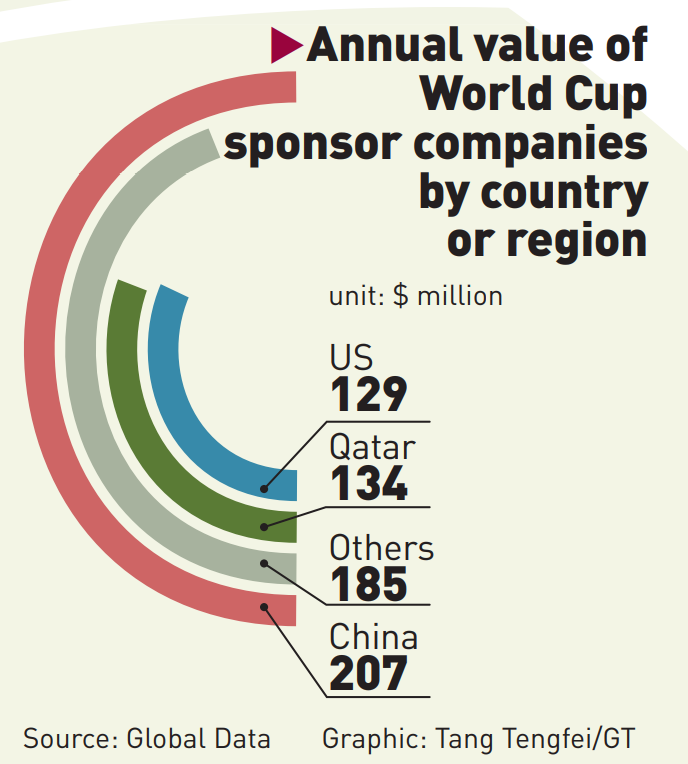
Graphic: Tang Tengfei/GT
Growing influence
Chinese brands' presence at the World Cup reflects their aspirations to expand their recognition both in domestic market and overseas to a level that matches their growing size and reach, experts said.
Hisense Group for example gained wide attention for its advertising slogan at the competition "Made in China, working together," an updated slogan which the brand later explained reflected its aspiration to stand firm in international market.
Two months before the World Cup began, Hisense opened its first flagship store in Lagoona Mall, a high-end shopping mall in Doha, the capital of Qatar. It marks Hisense's second flagship store in the Middle East after the opening of the flagship store in Dubai in March this year.
With the help of large-scale international sports events, Chinese brands have improved their international visibility and growth in a wider overseas markets.
Data shows that Hisense's overseas business accounted for 54.34 percent in 2021, up from the 33.92 percent in 2016. Overseas sales revenue also increased from 19.6 billion yuan ($2.80 billion) to 72.5 billion yuan, taking up from less than 20 percent to 41.3 percent of its total revenue.
China's dairy product manufacturer Mengniu, which singed Lionel Messi and Kylian Mbappe as brand ambassadors saw its overseas revenue increase by more than 74 percent, a considerable growth rate, during the reporting period in its half-year financial results.
Although Chinese sponsors presence at the World Cup only began as recently as the 2010 World Cup, it has become a rapidly expanding area of sponsorship and marketing spend for the country's major firms.
While solar panel manufacturer Yingli Solar became China's first World Cup sponsor at the 2010 South African tournament, Chinese companies made stronger presence at the 2018 competition in Russia.
No fewer than seven Chinese companies sponsored the 2018 World Cup in Russia, spending an estimated $835 million - far more than American and Russian brands, said media reports.
"The sponsorship for the World Cup can promote the brand to a higher level and help the brand to enter a wider international market," Zhang Yi, CEO of iiMedia Research Institute, told the Global Times on Monday.
According to Zhang, the directly sales volume boost may not be the most important result for Chinese sponsors seeking for.
"As they are in the process of going global, a successful sponsorship will generate them confidence," he said.
